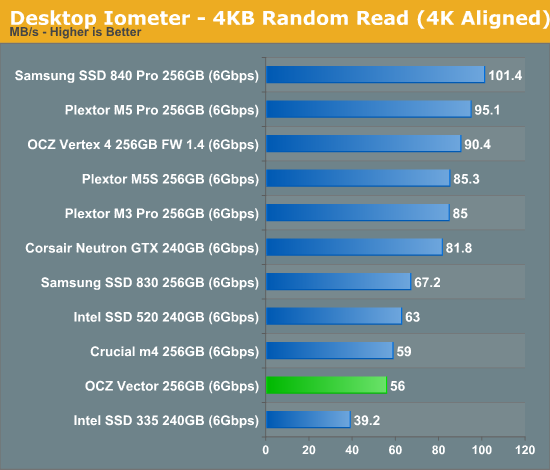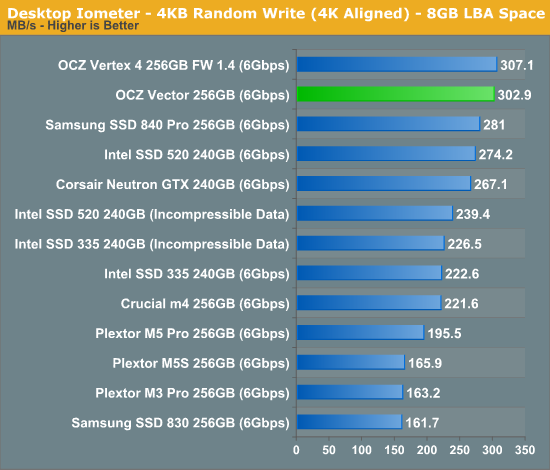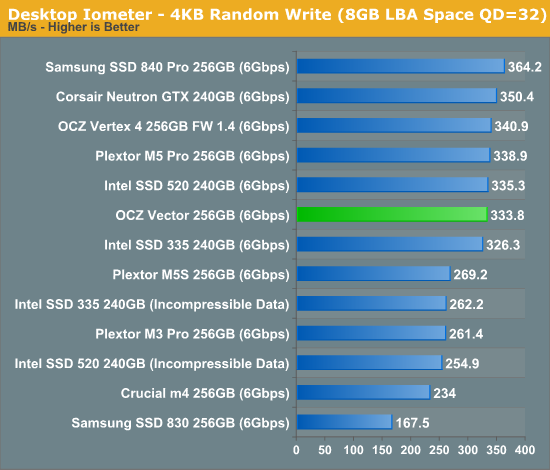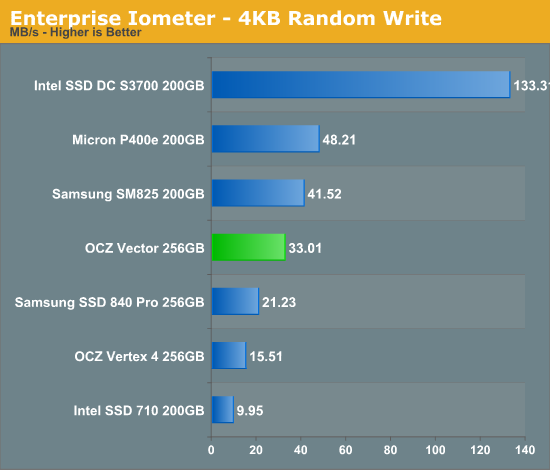OCZ Vector (256GB) Review
by Anand Lal Shimpi on November 27, 2012 9:10 PM ESTRandom Read/Write Speed
The four corners of SSD performance are as follows: random read, random write, sequential read and sequential write speed. Random accesses are generally small in size, while sequential accesses tend to be larger and thus we have the four Iometer tests we use in all of our reviews.
Our first test writes 4KB in a completely random pattern over an 8GB space of the drive to simulate the sort of random access that you'd see on an OS drive (even this is more stressful than a normal desktop user would see). I perform three concurrent IOs and run the test for 3 minutes. The results reported are in average MB/s over the entire time. We use both standard pseudo randomly generated data for each write as well as fully random data to show you both the maximum and minimum performance offered by SandForce based drives in these tests. The average performance of SF drives will likely be somewhere in between the two values for each drive you see in the graphs. For an understanding of why this matters, read our original SandForce article.

Low queue depth random read performance sees a significant regression compared to the Vertex 4. OCZ derives the Vector's specs at a queue depth of 32, at which it'll push 373MB/s of 4KB random reads. As Intel has established in the past, low queue depth random read performance of around 40 - 50MB/s is sufficient for most client workloads as we'll soon see in our trace based storage bench suite.

Low queue depth random write performance is a very different story, here the Vector pretty much equals the Vertex 4's already excellent score.
Many of you have asked for random write performance at higher queue depths. What I have below is our 4KB random write test performed at a queue depth of 32 instead of 3. While the vast majority of desktop usage models experience queue depths of 0 - 5, higher depths are possible in heavy I/O (and multi-user) workloads:

Crank up the queue depth and the Vector does well, but Samsung's SSD 840 Pro manages a nearly 10% performance advantage here.
Steady State 4KB Random Write Performance
OCZ will surely derive enterprise versions of the Vector and its Barefoot 3 controller, but I was curious to see what steady state 4KB random write performance looked like on the drive. I grabbed some of our Enterprise Iometer results from the S3700 review and trimmed out the non-SATA drives. The results are hugely improved compared to the Vertex 4:

Keep in mind this isn't an enterprise drive, and thus it's not too surprising to see significantly higher numbers here from other enterprise drives but the improvement over the Vertex 4 is substantial. Note that Samsung's SSD 840 Pro lands somewhere in between the Vector and Vertex 4.










151 Comments
View All Comments
Death666Angel - Friday, November 30, 2012 - link
In one of the podcasts (E10?) Anand talks about how SF controllers have less issues with these IO latency worst case scenarios. So it's not necessarily an Intel feature, but a SF feature and the graph might look the same with a Vertex 3 etc.Also, it may behave differently if it were filled with different sequential data at the start of the test and if the test were to run longer. I wouldn't draw such a positive conclusion from the test Anand has done there. :)
jonjonjonj - Thursday, November 29, 2012 - link
did they have to name their 2 drives Vector and Vertex? they couldnt have picked 2 names that looked more alike if they tried. i have to image this was done on purpose for some reason that i can think of. now that ocz has its own controller are they retiring the vertex or will they just use barefoot controllers in vertex ssd's going forward?deltatux - Sunday, December 2, 2012 - link
While it is great that the OCZ Vector is able to compete with the Samsung SSDs in terms of performance, but OCZ's past reliability records have been iffy at most, they fail prematurely and RMA rates have been quite high. I've known countless people suffering issues with OCZ drives.I'll wait for a bit before recommending OCZ drives to anyone again due to reliability issues if the OCZ Vector can meet the reliability of Corsair, Intel or Samsung drives. Until then, I'll keep recommending Samsung drives as they exceed in performance and reliability than most manufacturers.
rob.laur - Sunday, December 2, 2012 - link
If you check the review of the Vector on the hardwarecanucks website, page 11 you will see the Vector AND Vertex crush every other drive listed when filled with over 50% capacity. This is probably the most important bench to judge SSD performance by."While the Vector 256GB may not have topped our charts when empty, it actually blasted ahead of every other drive available when there was actual data housed on it. To us, that’s even more important than initial performance since no one keeps their brand new drive completely empty. "
jwilliams4200 - Sunday, December 2, 2012 - link
If you are talking about this:http://www.hardwarecanucks.com/forum/hardware-canu...
you will note that the Samsung 840 Pro is conspicuously absent from the list, so we do not know how the Vector fares against its most difficult competitor.
rob.laur - Sunday, December 2, 2012 - link
you are right and I wish they did include the 840 Pro but they didn't. Point is compared to all those other SSDs/Controllers, the BF3 clearly outperforms everything in the real world with actual data on the drive. The 840 Pro uses faster nand than the Vector yet both drives are pretty much equal. The toshiba toggle version of Vector cant come soon enough!jwilliams4200 - Monday, December 3, 2012 - link
The Samsung 840 Pro is significantly faster (about 33%) than the Vector for 4KiB QD1 random reads. This is an important metric, since small random reads are the slowest operation on a drive, and if you are going to take just one figure of merit for an SSD, that is a good one.rob.laur - Monday, December 3, 2012 - link
well according to most sites, the Vector beats it on writes and in mixed read/write environments especially with heavy use. Not to mention the 840 takes a long time to gets its performance back after getting hammered hard whereas the Vector recovers very quickly.jwilliams4200 - Monday, December 3, 2012 - link
First of all, the type of heavy writes I believe you are referring to are a very uncommon workload for most home users, even enthusiasts. Reads are much more common.Second, I have seen only one credible study of Vector use with heavy writes, and the Samsung 840 Pro does a better than the Vector with steady-state, heavy writes:
http://www.anandtech.com/show/6363/ocz-vector-revi...
I have seen nothing to suggest the Vector recovers more quickly. If anything, there is circumstantial evidence that the Vector has delayed recovery after heavy writes (assuming the Vector is similar to the Vertex 4) due to the Vector's quirky "storage mode" type behavior:
http://www.tomshardware.com/reviews/vertex-4-firmw...
jwilliams4200 - Monday, December 3, 2012 - link
My first link was meant to go to storagereview:http://www.storagereview.com/ocz_vector_ssd_review